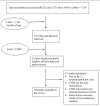A realist synthesis of randomised control trials involving use of community health workers for delivering child health interventions in low and middle income countries
- PMID: 20942900
- PMCID: PMC2964693
- DOI: 10.1186/1472-6963-10-286
A realist synthesis of randomised control trials involving use of community health workers for delivering child health interventions in low and middle income countries
Abstract
Background: A key constraint to saturating coverage of interventions for reducing the burden of childhood illnesses in Low and Middle Income Countries (LMIC) is the lack of human resources. Community health workers (CHW) are potentially important actors in bridging this gap. Evidence exists on effectiveness of CHW in management of some childhood illnesses (IMCI). However, we need to know how and when this comes to be. We examine evidence from randomized control trials (RCT) on CHW interventions in IMCI in LMIC from a realist perspective with the aim to see if they can yield insight into the working of the interventions, when examined from a different perspective.
Methods: The realist approach involves educing the mechanisms through which an intervention produced an outcome in a particular context. 'Mechanisms' are reactions, triggered by the interaction of the intervention and a certain context, which lead to change. These are often only implicit and are actually hypothesized by the reviewer. This review is limited to unravelling these from the RCTs; it is thus a hypothesis generating exercise.
Results: Interventions to improve CHW performance included 'Skills based training of CHW', 'Supervision and referral support from public health services', 'Positioning of CHW in the community'. When interventions were applied in context of CHW programs embedded in local health services, with beneficiaries who valued services and had unmet needs, the interventions worked if following mechanisms were triggered: anticipation of being valued by the community; perception of improvement in social status; sense of relatedness with beneficiaries and public services; increase in self esteem; sense of self efficacy and enactive mastery of tasks; sense of credibility, legitimacy and assurance that there was a system for back-up support. Studies also showed that if context differed, even with similar interventions, negative mechanisms could be triggered, compromising CHW performance.
Conclusion: The aim of this review was to explore if RCTs could yield insight into the working of the interventions, when examined from a different, a realist perspective. We found that RCTs did yield some insight, but the hypotheses generated were very general and not well refined. These hypotheses need to be tested and refined in further studies.
References
-
- UNICEF. The state of world's children 2008. Child Survival. http://www.unicef.org/publications/files/The_State_of_the_Worlds_Childre... [Accessed 11 Nov 2008]
-
- World Health Report. 2008. http://www.who.int/whr/2008/whr08_en.pdf [Accessed: 20/11/08]
-
- Lehmann U, Sanders D. Community Health Workers: What do we know about them. The state of the evidence on programmes, activities, costs and impact on health outcomes of using community health workers: Evidence and Information for Policy, Department of Human Resources for Health, World Health Organisation, Geneva; 2007.
Publication types
MeSH terms
LinkOut - more resources
Full Text Sources
Medical
Miscellaneous


